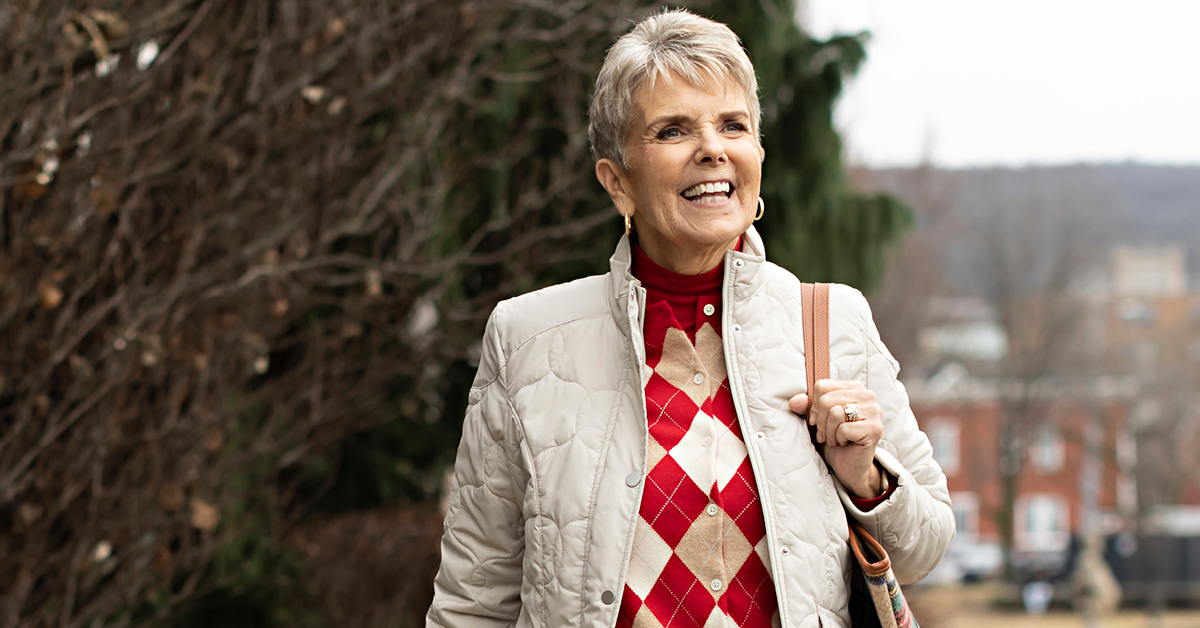A Triumph of the Heart - A Life Renewed
Getting back on skis and back on the golf course might seem routine, but for Anita Krick, they are symbols of triumph over life-and-death health challenges.
Krick successfully manages her congestive heart failure, discovered about six years ago, and is cancer-free after an operation last fall for lung cancer, discovered during ongoing monitoring of her heart failure. In both cases, her health journey was with Lehigh Valley Health Network (LVHN), and she wouldn't have it any other way.
“I tell the world. I always tell them I went to Lehigh Valley,” Krick says.

Breathless on the slopes
Nearly six years ago, Krick, now 71, came off the ski slopes more out of breath than she could ever remember. She went to her primary care doctor, John Peters, DO, for what she surmised was bronchitis, but he quickly ruled it out and sent her for heart tests. She learned she had severe congestive heart failure.
Krick, from Allentown, says there was test after test and even talk of a potential heart transplant in the wake of her diagnosis. However, working with cardiologists from Lehigh Valley Heart and Vascular Institute, medication was used to help improve her heart function and in August 2017, she received an implanted automatic defibrillator to counter any potentially lethal heart rhythm disturbance.
What is heart failure?
Heart failure occurs when the heart is unable to pump enough oxygen-rich blood with each beat. When that happens, there is a shortage of blood to vital organs, such as the lungs. Krick's heart failure was on the more severe side of the scale because she experienced shortness of breath with minimal physical exertion.
“We were able to improve Anita's heart pumping ability and her quality of life, how much exercise she can do, and most importantly her length of life,” says Krick's cardiologist, Ronald Freudenberger, MD, Physician in Chief, Lehigh Valley Heart and Vascular Institute.
With heart failure, Freudenberger says the first task is to figure out why the heart isn't pumping as it should. Treatment options vary based on the cause and could include medication, clearing blocked arteries and installing stents to keep them open, or bypass surgery. Other potential options, also depending on the patient, are things such as the defibrillator Krick received, or a left ventricular assist device.
The Heart and Vascular Institute also is involved in a gene therapy trial, the object of which is to get the heart to grow new blood vessels to transport blood to areas of the heart that previously were not getting any blood supply.
Cancer scare
A few years after her heart failure diagnosis, routine monitoring for Krick discovered she had emphysema, and spots were later found on her lungs. She recalled seeing the words “possible cancerous growth” in the test report on her MyLVHN patient portal.
This past October, after continued monitoring, Krick underwent robotic-assisted surgery to remove the growth, which was indeed cancerous. Surgeon Richard Chang, MD, was able to remove all the cancer and not have to take any of Krick's lymph nodes. She did not require chemotherapy or radiation.
“If they weren't watching me from the get-go, this would've spread. I'm truly lucky and blessed,” says Krick, a retired regional sales director for a talent management company.

Heart failure under control
Krick says she feels great. “I sometime wonder: Do I really have it [heart failure]?,” Krick says. I walk about four miles three times a week.”
Freudenberger says teamwork is key to success. “We're fortunate because we have built a team for treatment of advanced heart failure patients with cardiologists, cardiac surgeons, nurse practitioners, nurses and therapists.”
He added the Heart and Vascular Institute has a full heart failure program that wraps around the patient and can address all their needs. “We also have more advanced heart failure doctors in our organization than anyone else in the area and that allows us to really get the world's experts in advanced heart failure treatment,” he says.
“There is nothing more exciting and rewarding than being able to feel you've contributed to the health and well-being of someone who might not have done well without your help,” he says.
The Heart and Vascular Institute, says Freudenberger, is committed not only to taking excellent care of patients, and teaching, but also to developing the next generation of therapies for patients with heart failure and other heart diseases.
For Krick, successfully dealing with heart failure and cancer came by way of a combination of expertise and compassion from LVHN. “I had a great team and found them all [LVHN doctors and caregivers] to be personally caring. I never felt like a number in any of it,” says Krick.
Lehigh Valley Health Network | lvhn.org
This post is a sponsored collaboration between Lehigh Valley Health Network and Lehigh Valley Style.















